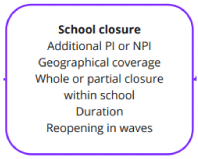School closure in response to epidemic outbreaks: Systems-based logic model of downstream impacts
- PMID: 32864104
- PMCID: PMC7445561
- DOI: 10.12688/f1000research.23631.1
School closure in response to epidemic outbreaks: Systems-based logic model of downstream impacts
Abstract
Background: School closures have been a recommended non-pharmaceutical intervention in pandemic response owing to the potential to reduce transmission of infection between children, school staff and those that they contact. However, given the many roles that schools play in society, closure for any extended period is likely to have additional impacts. Literature reviews of research exploring school closure to date have focused upon epidemiological effects; there is an unmet need for research that considers the multiplicity of potential impacts of school closures. Methods: We used systematic searching, coding and synthesis techniques to develop a systems-based logic model. We included literature related to school closure planned in response to epidemics large and small, spanning the 1918-19 'flu pandemic through to the emerging literature on the 2019 novel coronavirus. We used over 170 research studies and a number of policy documents to inform our model. Results: The model organises the concepts used by authors into seven higher level domains: children's health and wellbeing, children's education, impacts on teachers and other school staff, the school organisation, considerations for parents and families, public health considerations, and broader economic impacts. The model also collates ideas about potential moderating factors and ethical considerations. While dependent upon the nature of epidemics experienced to date, we aim for the model to provide a starting point for theorising about school closures in general, and as part of a wider system that is influenced by contextual and population factors. Conclusions: The model highlights that the impacts of school closures are much broader than those related solely to health, and demonstrates that there is a need for further concerted work in this area. The publication of this logic model should help to frame future research in this area and aid decision-makers when considering future school closure policy and possible mitigation strategies.
Keywords: COVID-19; School closure; conceptual framework; evidence synthesis; logic model; novel coronavirus; pandemic.
Copyright: © 2020 Kneale D et al.
Conflict of interest statement
No competing interests were disclosed.
Figures










References
MeSH terms
LinkOut - more resources
Full Text Sources
Medical

